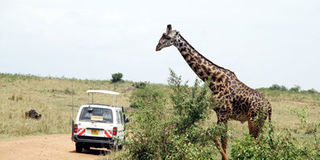It should worry us that our leaders seem to have no idea what we need

Tourists having a closer view of a giraffe at the Masai Mara National Reserve on August 11, 2014. PHOTO | SULEIMAN MBATIAH | NATION MEDIA GROUP
What you need to know:
- Because many Kenyans feel disconnected from the government, they have simply stopped engaging with the goings-on in the country.
- Nairobi’s excruciating traffic jams had a chance of becoming more tolerable, the President issued a directive to allow 14-seat matatus back into the city.
- The national government and counties need to look at cities that have adopted best practice public transport models and the benefits that have accrued from investing in this sector.
Sometimes I feel as if many people in the present government live in a parallel universe.
In that universe, State House and ministries draw up plans and strategies based on an idea of Kenya that only exists in their imagination.
Cabinet secretaries appear to be carrying out elaborate, well-thought-out blueprints to propel the country to a sustainable and progressive emerging economy, but these blueprints are not rooted in reality.
Because many Kenyans feel disconnected from the government, they have simply stopped engaging with the goings-on in the country.
They have stopped reading newspapers or watching the news. They have cocooned themselves in their own little universe, away from politics.
Thus, at least half the country is in a state of confused depression while the other half is in utter denial. Government policies and actions that may have led to street protests just a few years ago are being met with either apathy or an “uta do?” attitude. Those who criticise the government are labelled as unpatriotic.
As a columnist who has criticised both the government’s and the opposition’s stand on various issues, I am on the receiving end of hate mail and angry letters by readers who view my critiques as treason.
I am constantly reminded that I should be grateful to have Kenyan citizenship and that my column should focus on all that is wonderful and right about this country such as its scenic vistas, mild weather, and the fact that the economy is purring along nicely.
FORM OF PATRIOTISM
They cannot see that criticism is a form of patriotism. If I did not care for this country and its future, I would not be highlighting its failures and weaknesses. I believe that exposing the fault lines that could turn Kenya into a failed state or dysfunctional society is a patriotic duty.
Several incidents in just the past few weeks show how out of touch the government is with citizens’ concerns. Just when we thought that Nairobi’s excruciating traffic jams had a chance of becoming more tolerable, the President issued a directive to allow 14-seat matatus back into the city.
This means that all past efforts to decongest the city may come to nought. Besides, should any scheme to streamline or regulate the transport sector be drawn up in consultation with counties, which probably have drawn up their own plans, and not be issued through “roadside directives”?
The President must be aware that the absence of an affordable, safe, environmentally friendly, and less obstructive public transport system is hindering Nairobi’s aspirations to become a world-class city. Hours lost on the road translate into less time spent doing productive work that contributes to the GDP.
MAFIA STYLE SECTOR
While I am all for the innovative art work painted on matatus, allowing the rogue 14-seaters to dominate the roads gives a nod to a mafia-style sector that has cost many Kenyans their lives, polluted the environment, contributed to gridlocks, and held commuters to ransom.
The national government and counties need to look at cities that have adopted best practice public transport models and the benefits that have accrued from investing in this sector.
Curitiba in Brazil is often cited as a city that adopted an economically and environmentally sustainable integrated bus system to reduce traffic. When it was first introduced, more than a quarter of the commuter population abandoned their cars and began using buses. Consumption of fuel also dropped dramatically.
In other cities, light rail and dedicated bus lanes have been built to ease congestion. Many countries are also making cities more pedestrian-friendly, which has not only impacted the retail sector positively, but also encouraged more people to walk.
Another example of the parallel universe I talked of earlier: In the very week that the Tourism Cabinet secretary was in London appealing to the British government to lift travel advisories to Kenya, two dozen police officers were killed in Kapedo and gangs attacked an Administration Police camp and a military barracks in Malindi and Mombasa, respectively.
Meanwhile, thanks to the Mpeketoni massacre in Lamu County and the subsequent curfew, Lamu island, Kenya’s most famous World Heritage Site and a leading holiday destination, became one of the least visited places on the planet.





